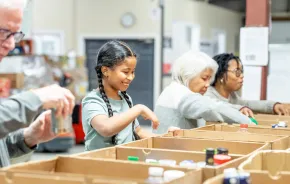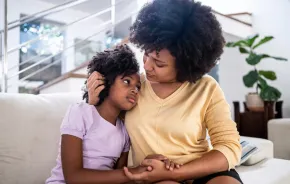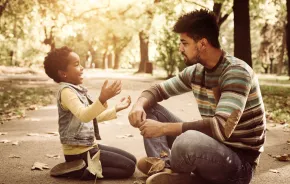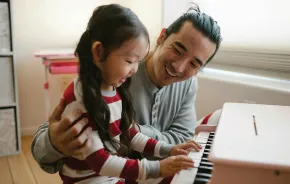
There is no test or scanning system that can identify LGBT people. If your kid is queer, they are queer and have been since the day you first brought them home — whether you knew it at the time or not.
Parents and parenting do not make kids gay (and cannot turn them straight), but parents and parenting can make a child feel either happy or miserable. The reality is that most of us will do both throughout our parenting career, but if you think that your child might be some flavor of not-straight, here are some tips to create a safe space in your home.
Understand that your child might be queer. They are made of human parts, and some humans beings are gay, some are not. Some humans are cis, some are not. It’s just science and probability.
Use media. Politics, song lyrics, commercials, television and movie plots can all spark conversation around gay issues and dynamics, allowing you to voice support and concern in a casual way, as well as acknowledging that you know there are all kinds of people and families in the world.
Make your house more gay-friendly. Having books by or about queer people on the shelf, adhering supportive stickers to the fridge, leaving out articles on the coffee table, or having your family participate in walks, rallies and fundraising for queer causes and rights are all ways to send a very clear, positive message.
Let your kid be different. Whether your kid is gay or straight, you may have a son who enjoys playing with dolls or redecorating the living room, or a daughter who spends time working on the car or playing baseball. What parent hasn’t had to sit through mind-numbing children’s television programming or an exhaustive tutorial about how those remarkably complicated collectible card games work? Supporting your child’s interests — even if it makes you uncomfortable — shows your child that you respect them.
Behave as though there were a queer person in the room. Don’t tell or laugh at gay jokes, and never utter demeaning terms or use slights about gay people or gay culture. Do: Use open-ended language and questions, and learn what terms not to say. Along the same lines, do not put up with hate speech voiced by others — in the grocery store, in church, at a family picnic. Silence in the face of overt anti-queer rhetoric implies consent — and your kid will notice. Clean up your messes if you’ve left a trail of unhelpful comments, terms or jokes that you now realize were offensive or degrading.
Remember that they are a minority, even if you are not. Most minorities are based on race and/or religion — aspects that tend to run generationally in families. But most parents of queer kids are straight. In minority families, being minority is a more natural and seamless part of the family structure and everyday dynamics; the politics and history are discussed, and traditions and rituals are passed down through generations. You may not be LGBT, but it is now your job to become an expert in this minority. Learn LGBT history, talk about the politics, create traditions.
Ask them. It can be okay to simply ask you child if they are gay or lesbian or bisexual, or how they identify sexually. Even the most well-intentioned parent risks possibly traumatizing a kid who isn’t (or isn’t ready, or isn’t comfortable) by asking, if that parent hasn’t done the prerequisite work of making sure their kid knows that they and their home are safe, affirming and supportive, regardless of their child’s answer. If you do ask, tell them that you heard it isn’t helpful or wise to make assumptions about such things. Make sure that you are able to say that you love them regardless of their answer (including “no matter what” is okay; “even though” is not okay ).
But the most important thing to do if you think your child might be LGBT is to show them that you are the parent whom they can tell in their own time. You do that by showing that you love and accept them.
Again, we can’t make them who they are, but we can impact how they feel about who they are. If, as a parent, you do some of these things, then if your child is LGBT, they won’t have to come out with fear and worry. It can just be about them being ready to share something important about themselves. And if your kid is straight, you will have taught them important lessons about openness, plurality and equality. Win, win.











